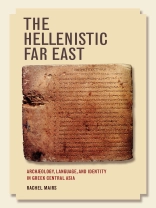In the aftermath of Alexander the Great’s conquests in the late fourth century B.C., Greek garrisons and settlements were established across Central Asia, through Bactria (modern-day Afghanistan) and into India. Over the next three hundred years, these settlements evolved into multiethnic, multilingual communities as much Greek as they were indigenous. To explore the lives and identities of the inhabitants of the Graeco-Bactrian and Indo-Greek kingdoms, Rachel Mairs marshals a variety of evidence, from archaeology, to coins, to documentary and historical texts. Looking particularly at the great city of Ai Khanoum, the only extensively excavated Hellenistic period urban site in Central Asia, Mairs explores how these ancient people lived, communicated, and understood themselves. Significant and original,
The Hellenistic Far East will highlight Bactrian studies as an important part of our understanding of the ancient world.
Inhoudsopgave
List of Illustrations
Acknowledgments
A Note on Abbreviations
Introduction
1. Administering Bactria: From Achaemenid Satrapy to Graeco-Bactrian State
2. Ai Khanoum
3. Self-Representation in the Inscriptions of Sophytos (Arachosia) and Heliodoros (India)
4. Waiting for the Barbarians: The Fall of Greek Bactria
Conclusion
Appendix: Greek Documents
Bibliography
Index
Over de auteur
Rachel Mairs is Lecturer in Classics at Reading University and the author of The Archaeology of the Hellenistic Far East: A Survey.












